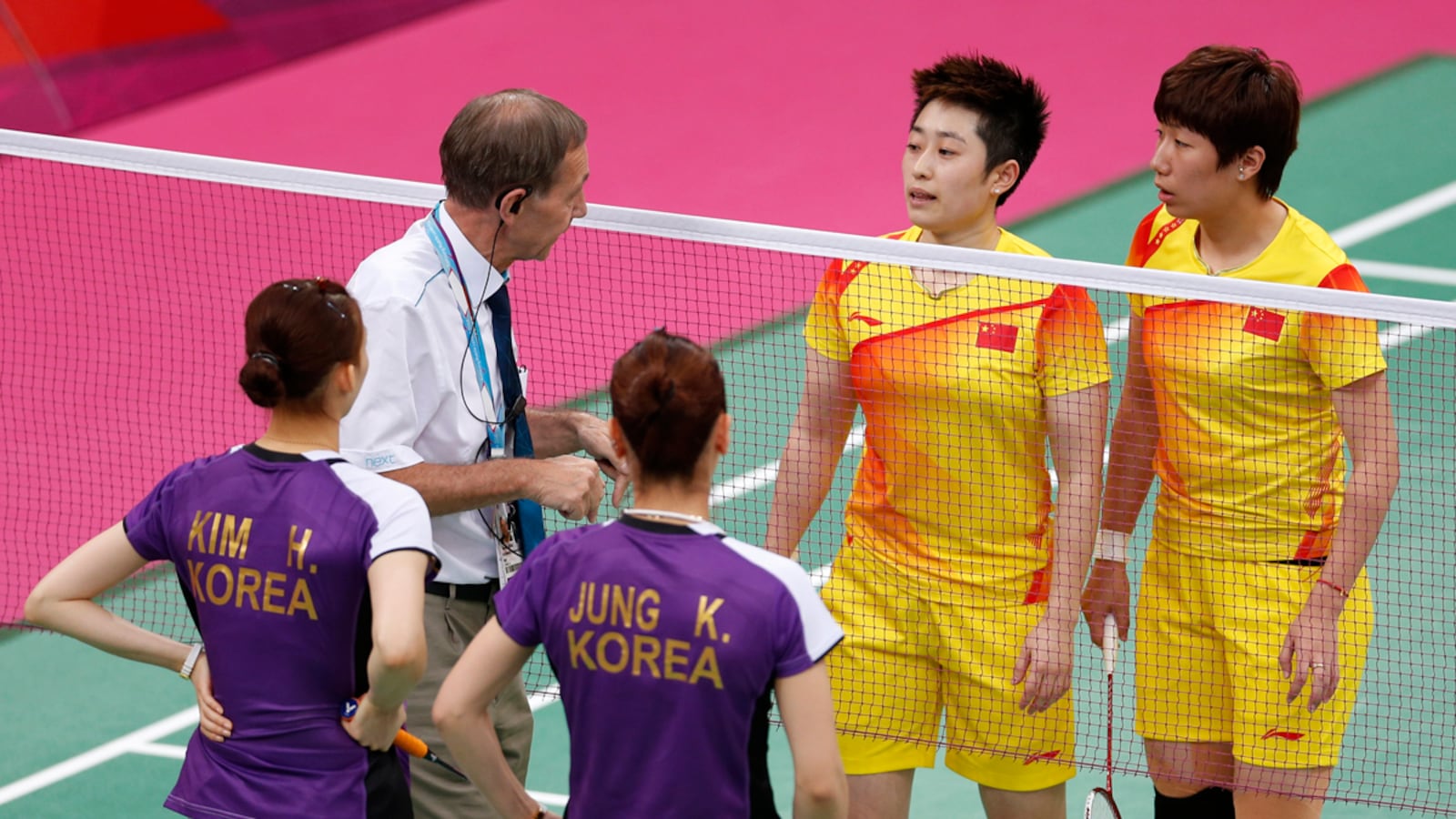BEIJING – Every four years, the world tunes in to see Olympic athletes compete in a sport most Americans associate with gym-class rejects: badminton.

Not so in China, where badminton is a national obsession for hundreds of millions of amateur and its top-ranked player, Lin Dan, 28, is a superstar on par with Michael Jordan during his NBA heyday—adorning billboards for sportswear brands and appearing in Redbull commercials.
But this Olympics, badminton is making headlines for all the wrong reasons. On Tuesday, eight female players, from China, South Korea, and Indonesia, set fire to a major scandal when they were caught deliberately trying to lose during qualifying matches—a tactic many in the badminton world say is common among Chinese players, who dominate the sport.
During the matches, the crowd at London’s Wembley Stadium booed and hissed as it became clear the teams, all from Asia, were intentionally playing poorly in order to be better positioned for the knockout phase of the competition.
The controversy swelled on Wednesday, when the World Badminton Federation disqualified the players, including the Chinese stars Yu Yang and her teammate, Wang Xiaoli, for "not using one's best efforts to win a match.”
For a nation obsessed with “feather hair ball”—as it’s known in Mandarin—and gold medals, the scandal was a daunting loss of face at a time when cheating suspicions continue to plague team China.
Yu, who won a gold medal during the 2008 Olympics in Beijing, promptly went on Chinese state television to beg forgiveness “because we did not comply with the Olympic spirit, and did not deliver a match with our true level to the audience, the fans and the friends."
But the pressure was apparently too much to bear. On Wednesday, Yu announced her imminent retirement from the sport on her microblog. "This is my last time competing. Goodbye Badminton World Federation, goodbye my beloved badminton," she wrote. "You have heartlessly shattered our dreams."
Reaction online was swift. “Yu Yang and Wang Xiaoli's behavior has disgraced the Chinese badminton team,” wrote Hu Xijin, the editor of the hyper-nationalist Global Times newspaper. “All the eight players are Asian, this calls for deep thoughts. Competition is fierce in Asian societies; people attach great importance to results while ignoring the process. How pathetic!”
But China’s badminton obsession looks like it will withstand the scandal. Ever since the country began opening to the West in the early 1980s, Chinese have been routing the competition at a sport originally created by prim British a century ago. Lin Dan, the badboy of the sport, is the only person to have completed the "Super Grand Slam", winning all nine major titles in world badminton.
So what is China’s secret weapon? The government. Like in other sports, the Communist Party pours millions of dollars into training badminton players, who eat, sleep, and breath shuttlecock.
"We discover talents at a young age and bring them into the training system early, which is beneficial in terms of specialized development," said Shi Fenghua, the vice-principal of the government-run Shichahai Sports School in Beijing.
Lin, the world’s top-ranked badminton player started training at age five, and his celebrity has gone a long way in promoting the sport in a country where baseball and football are nonexistent. Plus, it’s easy to find a pickup game in China's teeming urban hives.
“You can play it anywhere,” said Cai Lin, 22, a university student in Beijing, who has been playing badminton for more than a decade. “It’s convenient, healthy, fun and easy to learn. What’s not to love?”

Jiang Yi, the managing editor of Sports Illustrated China, gave another reason why the sport is so popular in the world’s most populous country. “This is the kind of sport China is really good at,” Jiang told The Daily Beast. “It’s a low-contact, individual sport and you need to be really agile and fast—perfect for Chinese. We’re not a confrontational type of people, and Chinese parents don’t want their kids playing violent sports, like soccer.”
As to why badminton is largely ignored, or even laughed, at in the US, Jiang threw the question right back. “Try explaining American football to Chinese people,” he said. “They don't really understand why a bunch of guys crashing into each other is fun either.”






